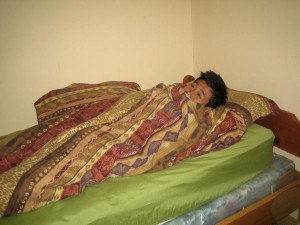The body utilizes fever as a way to fight off bacterial or viral infection. Always bear in mind that an elevated temperature is only a symptom, not an actual disease. Unless the fever is very high or the child is uncomfortable or at risk for febrile seizures, you have to perform measures to make the child comfortable. You can easily provide these measures properly by enrolling in a first aid class today.
http://youtu.be/Gj6kpUFw4Og
It is important to note that some children develop chills or shivering when they have fever. In case the temperature of the child rises higher than 104 degrees F or the child appears very ill, it is best to consult a doctor.
Steps in managing fever accompanied by shivering

- You have to dress the child using light clothing such as shorts or a t-shirt. The less clothing worn, the quicker the body can shed out the excess heat since it is lost through the skin.
- The child must be covered with a light blanket when he/she is shivering. Always bear in mind that shivering is how the body increases its temperature. You can remove the blanket when the shivering stops.
- Provide the child with extra clear fluids such as chicken broth, sports drink, juice or water. Take note that when a child has fever and starts to sweat, he/she will lose bodily fluids, thus leading to dehydration.
- Try to maintain the room temperature on the cool side ranging from 70-74 degrees F.
- Provide the child with ibuprofen or acetaminophen if his/her temperature increases above 102 degrees F and if he/she feels uncomfortable.
- With a washcloth, soak it in lukewarm or cool water. Make sure to wring out excess water and spread it over the forehead of the child or across the rear part of his/her neck.
Considerations to bear in mind
Infants below 6 months of age should not be given sports drinks. As for children below 18 years old, aspirin should not be given. Take note that aspirin is connected to Reye’s syndrome which causes symptoms similar to encephalitis and can lead to permanent disability or even death.
Infants below 2 months old should not be given any over-the-counter medications for pain or fever. It is important to consult a doctor first so that the appropriate treatment options can be provided. Additionally, ibuprofen should only be given to children 6 months of age or older.
